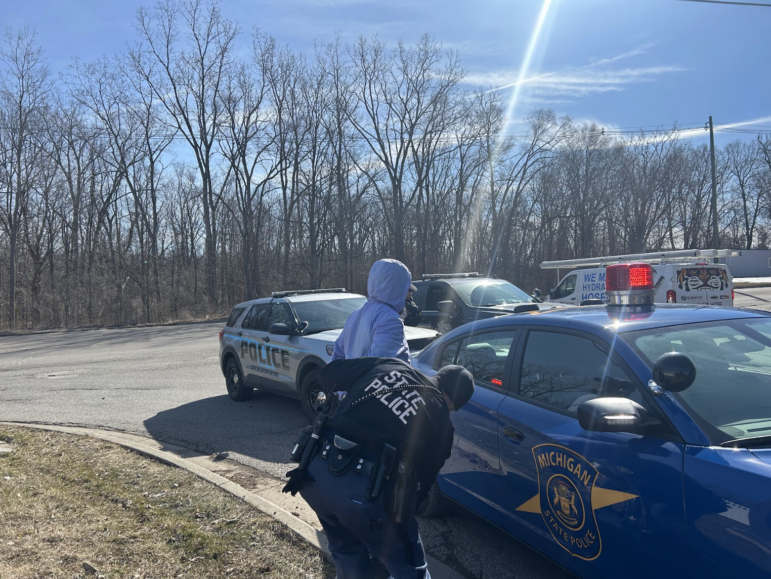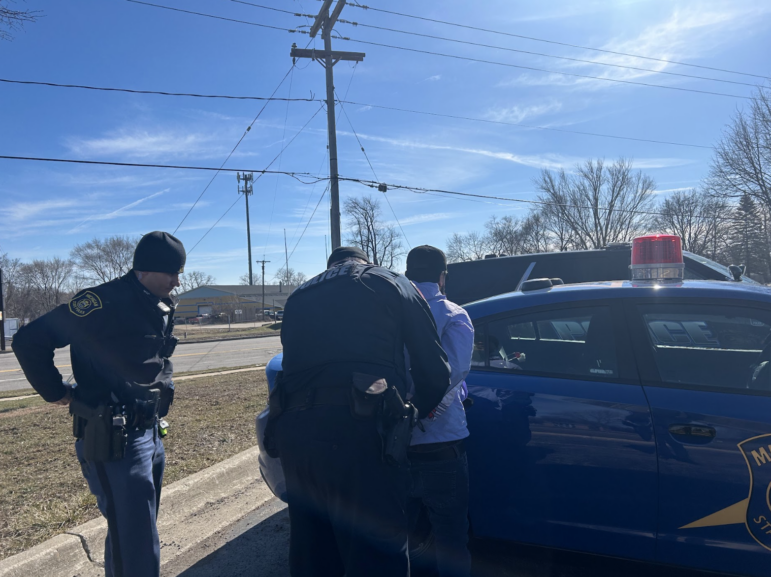
Owen McCarthy
Trooper David Versin parks his patrol car in Crandell Park in Charlotte, which he said is a nighttime hangout where local teenagers sometimes go drinking.By OWEN MCCARTHY
Capital News Service
EATON RAPIDS — State Trooper David Versin, 27, was parked at noon on a recent day on the median of Michigan Road, positioned to see cars coming over the gentle slope ahead, and around the bend behind him using his rearview mirror.
It had been about an hour and a half since Versin made a traffic stop — “a while since the last activity” he said.
The bosses “want us being proactive,” Versin said. “If we’re just sitting in our car on the median for 12 hours, is that a good use of your taxpayer money?”
With those words hanging in the air, Versin’s eyes locked on his rearview mirror where he saw a black pickup truck approaching. When the truck was in front of him, he spotted an orange sticker on the license plate.
That color indicated the tags were either valid until 2025 or had expired in 2023.
He quickly shifted his Dodge Charger into drive, pulled onto the road and sped off in pursuit — engine revving — while typing the plate number into his in-car computer.
“See him swerving a little bit?” Versin said as he gained ground. “So he’s focused on me. I’m not necessarily saying there’s criminal activity because nobody wants to get pulled over, but just something to keep in the back of your mind.”
The computer showed the tags were indeed expired, at which point Versin turned on his lights, prompting the truck to turn right into the driveway of an industrial park before stopping.
Versin parked behind it, opened his door and briskly walked up to the driver’s side window, his hand hovering near his hip holster. He does this during all stops in case a driver intends to hurt him, he said earlier.
A man wearing a light purple windbreaker with the hood up stared straight ahead and rolled down the window. There was a woman in the passenger seat.
The man was “reluctant” to give his name, Versin would tell another officer later.
The man initially gave one name, and later a different one when asked how his name appeared on his ID. The man said he didn’t have a license but did have a state ID card, just not with him.
After asking his date of birth, city of residence and confirming that information was up to date on his state ID card, Versin asked the woman if she had a license.
The man answered no for the woman, who seemed to understand only limited English.
Versin asked the woman her name. She looked at the trooper blankly, and the man hesitated before objecting to the questioning in a soft voice.
“Why are you asking?” he asked.
“So, my boss likes me to document everyone I come in contact with,” Versin replied.
“I’m the one driving the car,” the man cut in quietly.
Shortly after, Versin returned to his patrol car and searched the system for the name the man gave him. The system pulled up his photo and showed his license had been revoked, meaning it was illegal to be driving.
The system also showed three outstanding warrants from different courts.
That meant Versin needed to notify those courts to see if they wanted him arrested and brought in.
Knowing there was a possibility of arrest, Versin called for a second unit.
Meanwhile, Versin asked the driver to step out of the truck and lean on the hood of the patrol car. He asked for consent to search the truck, which the man declined.
One court did want the man on a warrant for failing to appear on a drug charge.
Versin explained the situation to the woman in the passenger seat and asked her name because she was in violation for not wearing a seatbelt while the car was in motion. He knocked lightly on the window and she rolled it down, only halfway at first.
Shortly after beginning his explanation, Versin spotted a baby in a car seat in the back.
“Is that your child back there?” he asked.
She nodded yes.
Versin asked the woman’s name. She answered. Versin returned to his cruiser and typed her name in the computer. He would later say several individuals with that name popped up, but none of their photos matched her.
Versin gave her a verbal warning for the seatbelt violation.
Versin worked with the second trooper who’d arrived to arrange a meeting spot with a local police officer who could take the arrested man to court. As they waited, Versin allowed the driver—who had been searched, handcuffed and was sitting in the patrol car’s passenger seat—to explain the situation to the woman.
She reached into the backseat and grabbed her child, who was covered in a yellow blanket, before slowly walking toward the arrested man.
He spoke to her in Spanish.
As he did, the baby’s head poked briefly from under the blanket, his eyes squinting from the sunlight. The baby was calm and silent.
The woman then covered the baby’s head with the blanket.
After a few minutes, the driver’s brother arrived. With Versin’s permission, the man had called him to pick up the truck.
Versin then drove the arrested driver to a nearby Wendy’s to meet up with a police officer from the city the court was in.
Versin arrived first. When the other officer arrived, he beamed, recognizing Versin because he had been a cadet in that officer’s department.
“I can’t believe to see you like this, oh my god!” the officer said while approaching Versin. “You suited up well.”
The officer escorted the arrested man out of Versin’s car, patted him down and guided him into his cruiser.
“I know you’ve been patted down several times. I’m going to do it one more time,” the officer told him.
This was Versin’s first arrest since the start of his shift at 6 a.m., but it wasn’t his only traffic stop of the day.
While parked on the median of I-69, Versin spotted a woman traveling northbound, talking on the phone.
Versin said he was going to ticket her.
“I am going to cite her,” Versin said as he maneuvered to get to a safe space on the road to initiate the pullover. “She didn’t even bother to try to hide it. So I’ll see if she’ll confess right up front when I go and talk to her, but a lot of crashes happen because of distracted driving.”
“I don’t want anything bad to happen,” he said. “Look at where she’s at with all these semis and stuff like that. If you hit any of these semis, that’s bad.”
After pulling her over and explaining the violation, the woman began crying and said she wasn’t aware of the law prohibiting people from holding their phone while driving, It took effect last July,
The woman, 25, was on her way to class at Michigan State University and told Versin she’d just broken up with her boyfriend of seven years after discovering he was cheating on her.
Because of her fragile emotional state, she said, she’d been trying to talk with someone close to her at all times.
“I’m sorry, it’s no excuse,” she said.
Versin returned to his patrol car and printed the ticket before walking back to the woman’s window and handing it to her. She accepted it solemnly.
Earlier in the day, Versin had stopped a driver for failing to completely stop at a stop sign while turning out of a Meijer parking lot on the outskirts of Grand Ledge.
The driver handed Versin his driver’s license and his retired military ID card.
“What branch were you in, sir?” Versin asked. “Army? I’m a Devil Dog so I appreciate your service.”
He told Versin he’d served 22 years.
“Wow, okay,” Versin said. “I only did six.”
After running the man’s information, he let him go with a verbal warning.
Versin said the system showed he’d never been pulled over, indicating he was a good driver.
“Just because he messed up this time doesn’t mean he always does it,” he said.
Versin later said the man handed him his retired military ID by accident, and instead meant to hand him his concealed pistol license card.
The man didn’t have a pistol with him, Versin said, but people often think they’re legally required to show their concealed pistol card whenever stopped by police, even if they’re unarmed.
Versin said he gives no preferential treatment to members of the military.
“I’ve had it where people hand me their military ID and expect I’m not going to do anything, which is not the case,” Versin said later. “Just because you wear a uniform doesn’t make you any bit more special.
“You still broke the law.”

Owen McCarthy
The arrested man is searched again, this time by a local police officer who would take him to court.
Owen McCarthy.
Trooper David Versin searches the driver he initially pulled over for having expired tags and later arrested on an outstanding warrant in a drug case.